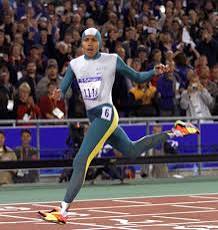Skip to content
“Cathy Freeman’s Fire: 25 Years On From Her Gold Medal Run”, marking the 25th anniversary of her iconic victory at the 2000 Sydney Olympics:

Cathy Freeman’s Fire: 25 Years On From Her Gold Medal Run
On the evening of September 25, 2000, Australia stood still.
Stadium Australia in Sydney roared with anticipation, but in homes, pubs, and public spaces around the nation, there was a collective silence—a breath held in unity.
All eyes were on a woman clad in a striking green and gold bodysuit: Cathy Freeman, a proud Kuku Yalanji and Birri Gubba woman, was about to run the race of her life in the 400 metres final at the Sydney Olympics.
Now, 25 years on, that moment still burns in Australia’s collective memory—not just as a sporting triumph, but as a powerful act of cultural and national significance.
A Moment Bigger Than Sport
Cathy Freeman’s gold medal was not just a win for Australia on the track.
It was a symbol of reconciliation, representation, and resilience.
Her race was the climax of years of pressure, expectation, and responsibility.
As the face of the Sydney Games, Freeman carried not only the hopes of a nation but the weight of history—Australia’s complicated relationship with its First Nations peoples.
She had already made history in 1994 when she celebrated her victory at the Commonwealth Games by carrying both the Australian and Aboriginal flags—a bold and controversial move at the time.
But in 2000, with the world watching, she didn’t need a flag to make a statement.
Her very presence on the track, and later on the podium, radiated pride, identity, and power.
As she ran that lap in 49.11 seconds, every stride seemed to carry generations.
The stadium erupted as she crossed the line first, but Cathy herself was quiet in her victory—overwhelmed, perhaps, by what it all meant.
The Fire Within
What made Cathy Freeman’s gold medal so significant was the context.
She had taken a break from competition leading up to the Games, returning to win silver at the World Championships in 1999. There were doubts about her form.
There was enormous pressure from media, sponsors, and the public.
And then there was the symbolic weight of being the final torchbearer at the Opening Ceremony, lighting the Olympic flame—a gesture of unity and reconciliation.
That image—Freeman, barefoot in a white bodysuit, standing in a pool of water, lighting the Olympic cauldron—has become one of the most iconic in Olympic history.
And just 10 days later, she fulfilled the prophecy.
Her victory wasn’t just about winning gold; it was about showing what was possible.
It was about visibility. It was about a young Aboriginal girl from Mackay who dreamed big, ran hard, and carried her people with her.
Legacy and Reflection
Two and a half decades later, Cathy Freeman remains a revered figure, not just in athletics but in Australian cultural life.
She retired from professional competition in 2003, but her impact has only deepened with time.
Through the Cathy Freeman Foundation, she has worked tirelessly to improve educational outcomes for Indigenous children, helping to close the gap through empowerment and opportunity.
Freeman’s race is now taught in schools as a defining moment of Australian history.
Documentaries such as “FREEMAN” (2020) have reignited public discussion about what her achievement meant—and continues to mean—for reconciliation in Australia.
Yet, the conversation around Indigenous rights, recognition, and reconciliation remains complex and, at times, fraught.
The 2023 Voice to Parliament referendum, which was ultimately unsuccessful, showed that Australia still has much work to do in confronting its past and building a just future for all.
In this context, Freeman’s gold medal run stands not as a solution, but as a powerful symbol.
It reminds us of the heights we can reach when unity, respect, and excellence come together.
It reminds us of the potential of sport to inspire and to heal.
A Timeless Flame
On this 25th anniversary, Australians reflect not only on the race itself, but on the fire it lit in hearts across the country.
Cathy Freeman’s victory was fleeting in time but eternal in impact.
It was a moment where sport transcended athletics and became a statement of identity and hope.
Today, as new generations of athletes rise, many cite Freeman as an inspiration—not just for what she achieved on the track, but for the grace, strength, and integrity she displayed in the face of enormous pressure.
Her story continues to blaze a trail for others to follow.
Cathy Freeman didn’t just run a race. She ran into history. And 25 years on, her fire still burns bright.

